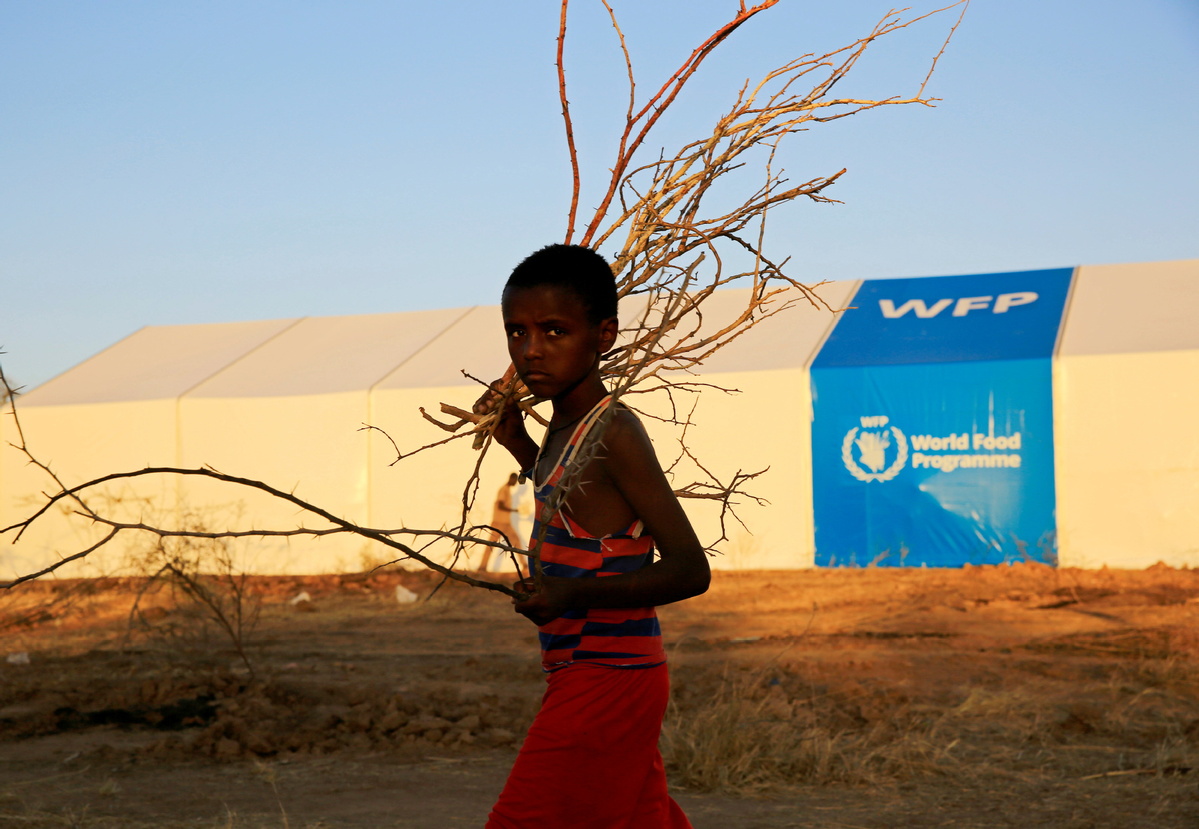Eritrean refugees in Ethiopia risk running out of food
Time of issue:
2020-12-04
Author:
Origin:

An Ethiopian refugee fleeing from the ongoing fighting in Tigray region, walks past a world food program tent , at the Um-Rakoba camp, on the Sudan-Ethiopia border, in the Al-Qadarif state, Sudan, on Nov 23, 2020. [Photo/Agencies]
The United Nations has urged Ethiopian officials to allow them to access almost 100,000 Eritrean refugees in the country's northern Tigray region amid reports people have run out of food as conflict rages between local leaders and the state's government.
In a statement released on Dec 1, Babar Baloch, the United Nations High Commission for Refugees spokesman, said communications and transport links to the Tigray region of 6 million people have been severed and he raised the UN's pleas for access to deliver badly needed food, medicines and other supplies.
"The camps will have now run out of food supplies, making hunger and malnutrition a real danger, a warning we have been issuing since the conflict began nearly a month ago. We are also alarmed at unconfirmed reports of attacks, abductions and forced recruitment at the refugee camps," Baloch said.
According to the UN, 2 million people in Tigray now need assistance, a figure that is twice the number before fighting began a month ago. In addition, 1 million people are displaced, including more than 45,000 Ethiopians who have fled into Sudan as refugees.
"For almost two decades Ethiopia has been a hospitable country for Eritrean refugees, but now we fear they are caught in the conflict. UNHCR appeals to the government of Ethiopia to continue to fulfill its responsibility in hosting and protecting Eritrean refugees and allow humanitarians to access people who are now desperately in need," Baloch said.
On Nov 30, the International Committee of the Red Cross said approximately 1,000 of the Eritrean refugees had arrived in Mekele, the Tigray regional capital, looking for food and other help.
"Some 1,000 Eritrean refugees have reportedly arrived in Mekele from refugee camps around Shire. Many are coming to ICRC's sub-delegation in Mekele looking for food and other support. All are reliant on humanitarian assistance, and supply chain disruptions into Mekele make it difficult to meet these needs today," said Maria Soledad, head of operations for the ICRC in Ethiopia.
Abiy Ahmed, Ethiopia's president, last month ordered military operations against leaders of the Tigray People's Liberation Front in response to what he said were TPLF-organized attacks on Ethiopian federal army camps.
According to ICRC, thousands have died so far and tens of thousands have fled into neighbouring Sudan. On Nov 29, Ahmed claimed victory after federal forces took control of the Tigray regional capital Mekele.
"I am pleased to share that we have completed and ceased the military operations in the Tigray region. Our focus now will be on rebuilding the region and providing humanitarian assistance while federal police apprehend the TPLF clique," Ahmed said.
Last week, Ahmed met with African Union envoys led by Joaquim Chissano, former president of Mozambique. During the meeting, Ahmed committed to receive, rehabilitate and resettle citizens who have fled. He also expressed his commitment to dialogue. On his part, Chissano expressed the African Union's commitment to continue working with people and the government of Ethiopia through its current security challenges.
By Otiato Opali in Nairobi, Kenya | chinadaily.com.cn | Updated: 2020-12-02 19:50


